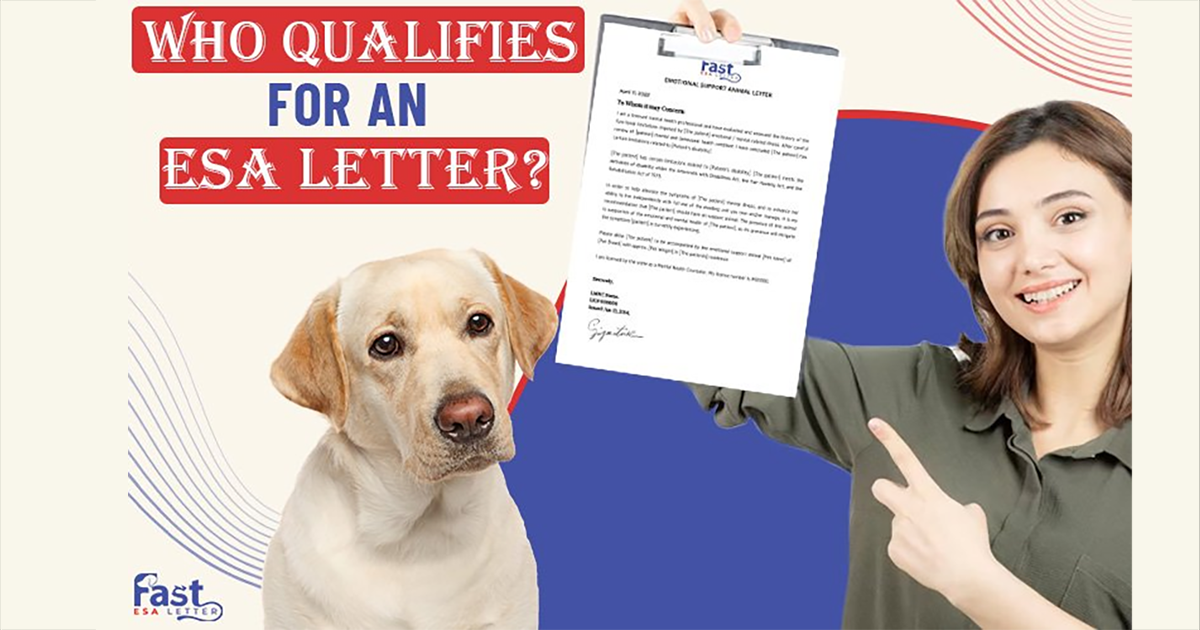Who Qualifies for an Emotional Support Animal Letter?

Robert Clendenin, MD
It’s a common question.
With mental health becoming an important part of wellness in the United States, more people are turning to emotional support animals for comfort.
Emotional support animals are incredible companions that provide relief from mental health challenges, but not everyone qualifies. In this guide, we’ll break down the criteria, the mental health conditions covered, and how you can get your very own ESA letter. Let’s dive in!

Do I Qualify for the ESA Letter Quiz?
- Do you have a qualifying mental health condition?
- Is the condition Self-diagnosed or medically diagnosed?
- Is your medical condition limiting your daily life activities?
- Do you have a pet?
- Does your pet comfort you with your medical condition?
- Are you financially and emotionally ready to bear the expenses of a pet?
- Are you aware about the rights of emotional support animals?
If you find these questions relatable, you may qualify for an ESA letter. With this letter, your companion animal can provide not just emotional support but also legal protection for housing. This allows you to live with your emotional support animal without worrying about pet fees or restrictions in “no-pet” accommodations. An ESA can make a significant difference in managing your mental health, offering comfort and relief in difficult times.
What Disabilities Qualify For An Emotional Support Animal?
Emotional Support Animals can provide comfort and assistance to individuals with various mental health conditions. These animals are prescribed by a licensed mental health professional to help alleviate symptoms of certain disabilities. Below is a list of conditions that may qualify someone for an ESA, helping to improve their emotional well-being and daily functioning.
- Post-Traumatic Stress Disorder (PTSD): Emotional support animals offer a sense of safety and can help ground you during flashbacks or intense stress.
- Depression: Pets are known to lift spirits, reduce feelings of isolation, and provide comfort during depressive episodes.
- Schizophrenia: An ESA can provide companionship, reduce feelings of loneliness, and help improve emotional stability.
- Personality Disorder: Emotional support animals may help individuals manage emotional fluctuations and foster a sense of connection.
- Attention-Deficit/Hyperactivity Disorder (ADHD): An ESA can help improve focus, reduce restlessness, and offer calming companionship.
- Anxiety: Emotional support animals are excellent at easing chronic anxiety and providing grounding during stressful moments.
- Mental Disorder: Emotional support animals offer unconditional love, which can be therapeutic for managing symptoms of mental illnesses.
- Specific Phobia: ESAs provide comfort and distraction, helping individuals cope with their fears in challenging situations.
- Bipolar Disorder: Emotional support animals are known to help stabilize emotional highs and lows, offering consistent support.
- Autism: ESAs can improve social interactions, reduce sensory overload, and offer a comforting presence.
- Learning Disability: Emotional support animals can provide encouragement and a calming influence, helping individuals stay motivated.
- Diabetes: While not directly therapeutic for blood sugar management, an ESA can reduce stress levels and promote overall emotional well-being.
My Condition Doesn’t Seem ‘Serious’ Enough. Should I Still Apply?
Do I Need a Doctor or Therapist for My ESA Letter?
- Licensed Therapists
- Psychiatrists
- Psychologists
- General Practitioners (in some cases)
It’s crucial that your ESA letter is written by a professional who is licensed to practice in your state. Beware of websites offering “instant” ESA letters without a proper mental health evaluation—they won’t hold up under legal scrutiny.
How Can I Get My ESA Letter?
Online Process
Getting an ESA letter online is fast, convenient, and allows you to connect with a licensed mental health professional (LMHP) from the comfort of your home. The process typically involves connecting to LMHP, followed by a virtual consultation. Once approved, your ESA letter is delivered straight to your mail.
If you’re looking for a fast and straightforward process, services like Fast ESA Letter offer a simple three-step method:
- Schedule an Appointment: Sign up on the Fast ESA Letter portal and schedule an appointment with a licensed mental health professional.
- Consultation: During the consultation, which takes place via audio or video call, the LMHP will evaluate your emotional or mental health needs and assess your eligibility for an ESA letter.
- Approval: If you qualify, the LMHP will approve your request. Your ESA letter will be sent directly to your email, often within 24-48 hours, making it one of the quickest and legitimate options available.
Offline Process
For those who prefer a traditional approach, you can also schedule an in-person appointment with a licensed therapist, psychiatrist, or psychologist. After evaluating your condition, the LMHP will provide you with an ESA letter if you qualify. You may receive the document either in person or by mail.
Regardless of the method, most ESA letters require annual renewal, so make sure you stay in contact with your provider to keep your letter valid.
What If I Don’t Qualify for an ESA Letter?
If you do not qualify for an Emotional Support Animal (ESA) letter, it’s important to remember that this doesn’t mean you won’t have access to other forms of support. ESA letters are typically issued by licensed mental health professionals who determine if an emotional support animal is a necessary part of managing a person’s mental health condition, such as anxiety, depression, or PTSD. However, if a mental health professional decides that an ESA is not appropriate for your situation, there are alternative ways to receive support.
Consider seeking other therapeutic methods, such as counseling, medication, or lifestyle changes, which can help manage mental health challenges. Therapy options like cognitive-behavioral therapy (CBT), mindfulness techniques, or group therapy may also provide significant benefits. Additionally, while you may not qualify for an ESA letter, you can still have pets, which can offer companionship and emotional support, even without the legal benefits of an ESA.
Furthermore, mental health professionals may recommend different types of assistance, such as service animals, therapy animals, or peer support groups, depending on your unique needs. Remember that emotional support can come from many sources, and finding the right solution for your mental health is a personalized process.
Conclusion
Ready to get the support you need? Visit Fast ESA Letter today, schedule an appointment, and start your journey with your emotional support animal!
Frequently Asked Questions (FAQs)
Is an ESA Letter Legally Binding For Housing?
Can I Use My Existing Pet as an Emotional Support Animal?
Can Children Qualify for an ESA Letter?
Does an ESA Letter Expire?
Is a Certificate, License, ID Card, or Vest Required for My Emotional Support Animal?
Can You Apply for an ESA Letter Before Getting an Emotional Support Animal?
What If I Pay for an Online Consultation and Don’t Qualify For an ESA Letter?
Why Is It Important to Consult an LMHP for an ESA Letter?
How Do I Know That the Person Who Wrote My ESA Letter Is Qualified?
Does My ESA Letter Need to Be Notarized or Contain a Perjury Statement?
Do I Need a Hard Copy of My ESA Letter?
What Happens If You Fake an ESA Letter?
Does an ESA Letter Reveal Details About My Condition?
Post Author
Prince Sharma
Related Articles
How Emotional Support Animals Help Veterans Reclaim Peace After Service?
How Emotional Support Animals Help Veterans Reclaim Peace After Service?Emotional Support Animals (ESAs) offer comfort and stability to veterans coping with PTSD, anxiety, and depression. They support veterans in rebuilding emotional resilience,...
Think Your ESA Is Illegal? These Laws May Surprise You.
Think Your ESA Is Illegal? These Laws May Surprise You.Breed restrictions do not typically apply to Emotional Support Animals (ESAs) under the Fair Housing Act (FHA). Landlords must accommodate ESAs regardless of breed, as long as they have proper...
Can a Guinea Pig Be an Emotional Support Animal?
Can a Guinea Pig Be An Emotional Support Animal?Yes, Guinea pigs can be a wonderful choice for emotional support animals. They offer comfort and companionship through their friendly behaviour. To have a guinea pig as an ESA, you’ll need an ESA letter...




